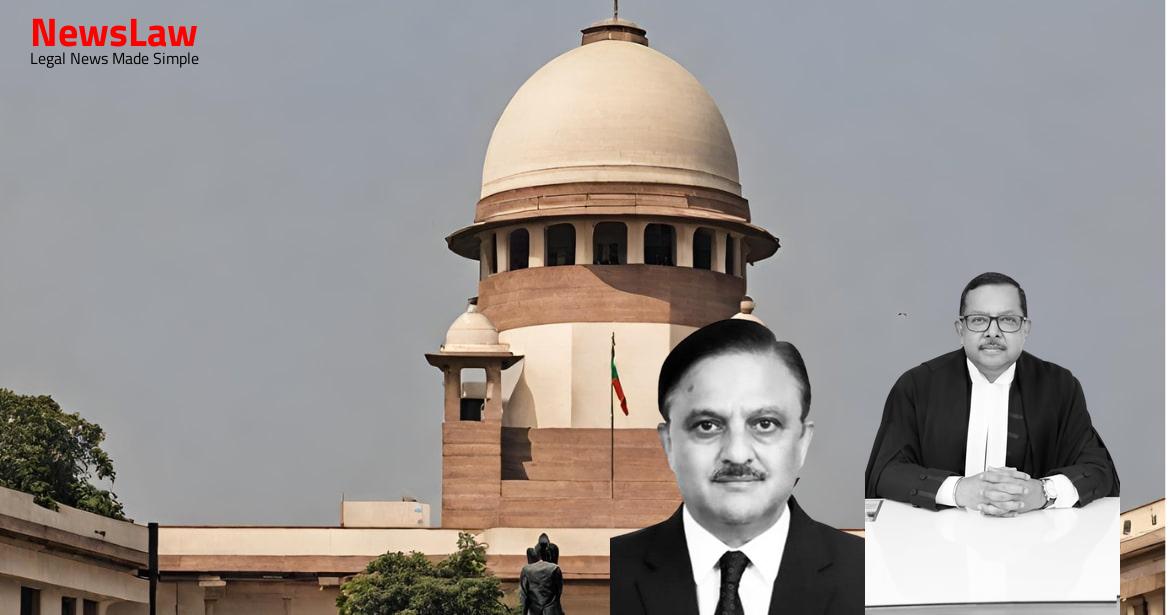Explore a case where the High Court analyzed the validity of an income tax reassessment concerning unaccounted cash introductions. The court delved into the legal framework governing the power to re-open assessments and emphasized the requirement of tangible material to justify reassessment. This summary highlights key points from the court’s legal analysis, shedding light on the intricate dynamics of tax assessments and judicial scrutiny.
Facts
- Assessee-company received share capital from entities with unestablished identity and creditworthiness, resulting in addition u/s 68.
- Return for AY 2010-11 accepted under section 143(1) without scrutiny.
- Notice for reassessment issued on 31.3.2017 based on search proceedings at M.R. Shah and Champalal group, revealing unaccounted money introductions.
- Materials showed cash credit of ₹70.01 crores received by Shirish Shah during a specific period.
- Search correlated data from SCS and Pradeep Birewar indicating unaccounted cash introduced through accommodation entries.
- AO found the assessee received credit amount but failed to establish cash source declared by Garg Logistics Pvt Ltd.
- Assessee was suspected to benefit from accommodation entries provided by Shirish Shah.
- Comparisons made between investments by Pravin Chandra Aggarwal and disclosures by Garg Logistics Pvt Ltd under IDS revealed discrepancies.
- Impugned notice for re-assessment issued on 31.3.2017 to reassess income for AY 2010-11.
- Revenue concluded that Shirish Shah provided accommodation entries through controlled companies, with the assessee being a beneficiary.
- Analysis of documents showed the involvement of Shirish Shah in providing accommodation entries through bogus companies.
- The AO could not have relied upon the declaration made by Garg Logistics in concluding that the addition in the hands of both K and the assessee-company was justified.
- The High Court held that the addition in the hands of both K and the assessee-company was justified as they are different persons subject to different causes of action under sections 69 and 68 respectively.
- The High Court found that there was no tangible material or reason for the AO to reopen the assessment, and the revenue’s justification for the reopening was resisted.
- The High Court also considered the circular of the CBDT dated 01.09.2016, particularly the answer to Query no.10, and noted that immunity was given in respect of amounts declared and brought to tax under the Finance Act, 2016.
- The objections of the assessee were rejected by the AO, leading the assessee to approach the High Court under Article 226 of the Constitution for redress.
Also Read: Balancing Power and Transparency: Electoral Bonds Struck Down, Disclosure Mandated
Arguments
- ARG_PETITIONER: The assessee’s senior counsel argued that the reassessment was not based on the IDS declaration of Garg Logistics, but on information gathered through search/seizure actions and survey proceedings related to common entry providers.
- The AO’s reasons for reassessment were deemed invalid and based on conjectures rather than tangible material, as per the High Court’s observations.
- The discrepancies noted by the AO were explained by the assessee and do not affect the quantification of the alleged escapement of income.
- The burden of proof was placed on the assessee to show that it did not route its own cash through the investments made by the companies connected to Garg Logistics.
- No incriminating material was found connecting the source of investment to the assessee, leading to concerns of double taxation if reassessment proceeds.
- The AO’s reasons lacked validity and did not align with the legal framework of Section 147 and 148 of the Act and IDS, making the reopening impermissible.
- The history of the assessee company’s transactions, association with accommodation entry providers like Pradeep Birewar, and routing of income through bogus share capital were highlighted as grounds for reassessment by the AO.
- The ASG argued that the assessee could not link the income disclosed by Garg Logistics under IDS 2016 to the investments made by the companies applying for shares, questioning the legitimacy of the sources of investment.
- The circular of CBDT dated 01.09.2016 and the original assessment under Section 143(1) were cited as not decisive factors in evaluating the validity of reassessment.
Also Read: Recall of Resolution Plan Approval: Legal Analysis
Analysis
- The distinction between power to review and power to re-assess is crucial, as outlined by statutory provisions.
- The AO’s reasons to believe must be based on tangible material to justify re-opening an assessment.
- The Income Declaration Scheme (IDS) is designed for voluntary disclosure of untaxed income, with limited immunity for declarants.
- The High Court erred in holding that the revenue was barred from scrutinizing the assessee’s return due to protection under the IDS.
- Reopening of assessment in this case was based on unaccounted income introduced in the assessee group through accommodation entries providers.
- The disclosure made by Garg Logistics under the IDS did not lead to the reassessment of the assessee.
- The basis for valid re-opening of assessment must be tangible material to scrutinize returns for the previous year.
- The AO utilized material submitted by the assessee’s chairman and correlated it with ROC data, not confidential IDS information of Garg Logistics.
- Credit received as share premium and capital was deemed not genuine but a mere accommodation entry to evade tax payment.
- Immunity under voluntary taxation schemes does not entail complete immunity.
- The Court re-stated the correct position regarding the Assessing Officer’s jurisdiction to re-open assessment based on the ‘reason to believe.’
- The action of the Income-tax Officer in initiating proceedings for income escaping assessment can be challenged in a Court of law if the reasons for the belief are irrational or irrelevant.
- A valid re-opening of assessment should be preceded by specific, reliable, and relevant information; the sufficiency of these reasons is not subject to judicial review.
- Facts disclosed in the return, if later found to be false, can serve as the basis for re-opening of assessment to prevent parties from benefiting from false statements made during the original assessment.
- Post-1st April 1989, the power to re-open assessments is wider, but the immunity granted cannot extend beyond specified provisions.
- Immunity granted under a tax amnesty scheme does not protect against actions under other laws; a firm and its partners have a direct co-relation regarding income.
- The ‘reasons to believe’ for re-opening assessments must be based on objective materials and a reasonable view, as stated in previous legal decisions.
- Parliament did not intend to extend immunity to smugglers and manipulators of foreign exchange under enactments other than those mentioned in Sections 11 and 16 of the Voluntary Disclosure Act.
- The court disagreed with the argument that authorities did not properly consider the explanation provided by the appellants.
- The High Court made an error in suggesting that a declaration under the IDS could lead to immunity from taxation for a non-declarant.
- The immunity conferred under the IDS is limited in nature and not absolute or universal.
Decision
- The AO is given the freedom to proceed with the re-assessment
- The impugned judgment is overturned
- The revenue’s appeal is accepted without cost
Case Title: DEPUTY COMMISSIONER OF INCOME TAX (CENTRAL) CIRCLE 1(2) Vs. M/S M.R. SHAH LOGISTICS PVT. LTD (2022 INSC 349)
Case Number: C.A. No.-002453-002453 / 2022



